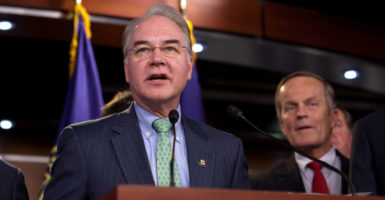President-elect Donald Trump’s selection of Rep. Tom Price of Georgia as the next secretary of the U.S. Department of Health and Human Services is an outstanding choice.
It is hard to imagine a candidate more qualified to serve in this crucial position, especially at a time when America’s health care economy is undergoing a major transition. He is not only a well-schooled expert in the nuances of complex public policies, but also an excellent communicator and debater.
An orthopedic surgeon by profession, Price began his public career as a member of the Georgia state Legislature. With over 12 years of service in the House of Representatives, including his service as chairman of the pivotal House Budget Committee, he has emerged as one of the most knowledgeable and effective members of Congress on federal budget and health policy.
Given his background as a state official, one can expect that he will be especially supportive of innovative health reforms at the state level.
Price’s approach to health policy, in particular, is best understood by an examination of his legislative record. He is the author of numerous bills and amendments, most notably the Empowering Patients First Act, a highly detailed legislative proposal that would repeal the Affordable Care Act and replace it with patient-centered provisions that would control costs and expand coverage in the private health insurance markets.
A number of Price’s proposals have been incorporated into the House Republican alternative to the failing Affordable Care Act, proposed under the leadership of House Speaker Paul Ryan.
Price’s measure would provide individual tax relief for health insurance for Americans to own and control their health insurance policies, just as they own and control their life insurance policies, making coverage fully portable and secure, from job to job and through different stages of life, without today’s outdated tax or regulatory penalties.
Patient choice of coverage combined with intense competition in the health insurance markets would not only control costs, but also stimulate innovation in benefit design and health care delivery.
By providing individual tax relief for health insurance, Price’s measure would remedy the central weakness in America’s health insurance markets, long recognized by health policy analysts and economists, including the late Nobel laureate Milton Friedman: the inflationary, dysfunctional, and inequitable federal tax treatment of health insurance.
Price has also proposed the creation of independent health insurance pools for more affordable coverage in the individual and small group markets, and also a change in the law allowing association health plans, enabling small business owners to band together across state lines.
Moreover, similar to Trump, Price supports strengthening and enhancing health savings accounts by allowing increased contributions and greater flexibility in the use of these accounts, as well as permitting individuals to buy health plans licensed in other states.
For ordinary Americans, the best reason to celebrate Trump’s choice: Price himself is a doctor. Today, doctors are demoralized by the reams of rules and regulations and paperwork imposed on them by politically-driven, bureaucratic third-party payment arrangements—a morass eating into their precious time and energy. Their patients, of course, are the ones who suffer the most.
With Price taking the helm of American health policy, doctors and patients alike have sound reasons to hope for a welcome and long-overdue change.




























